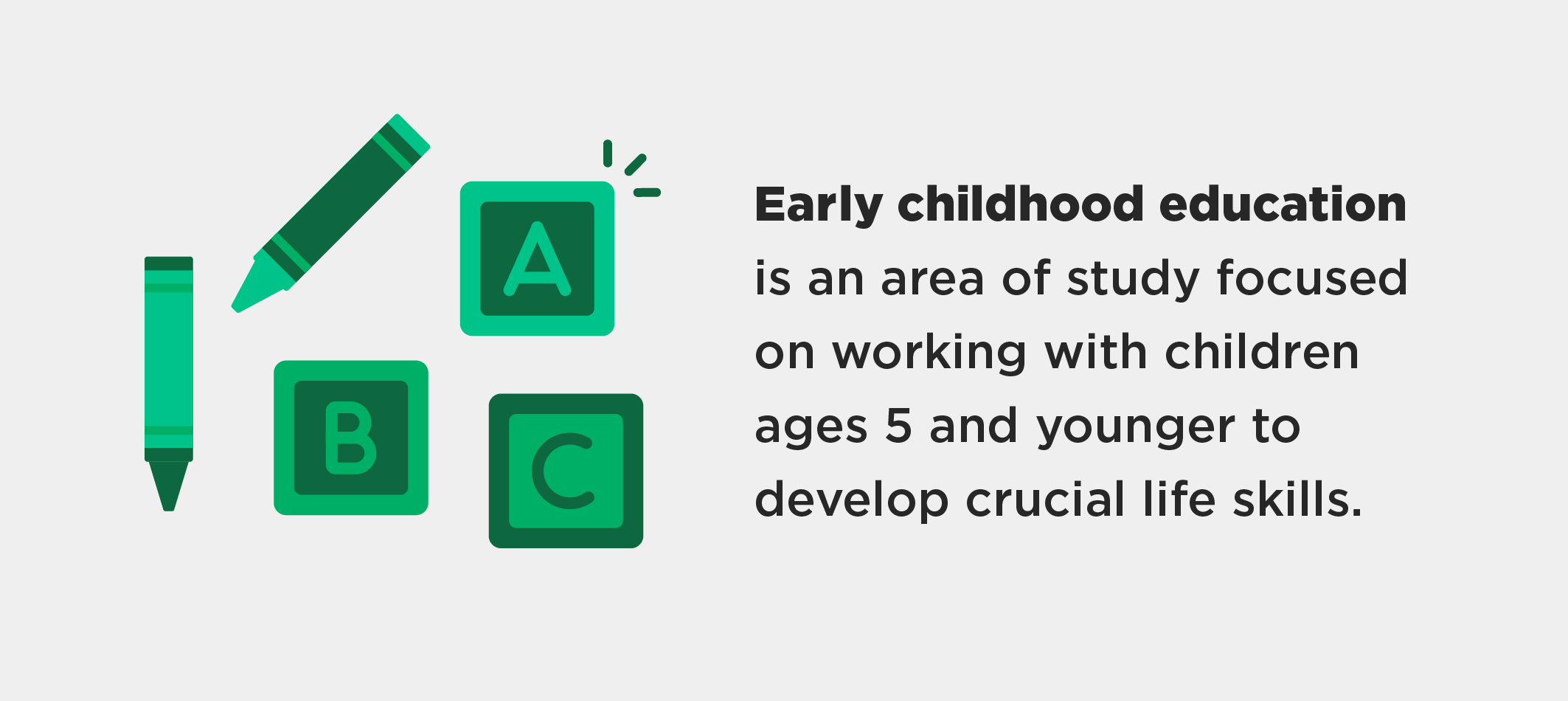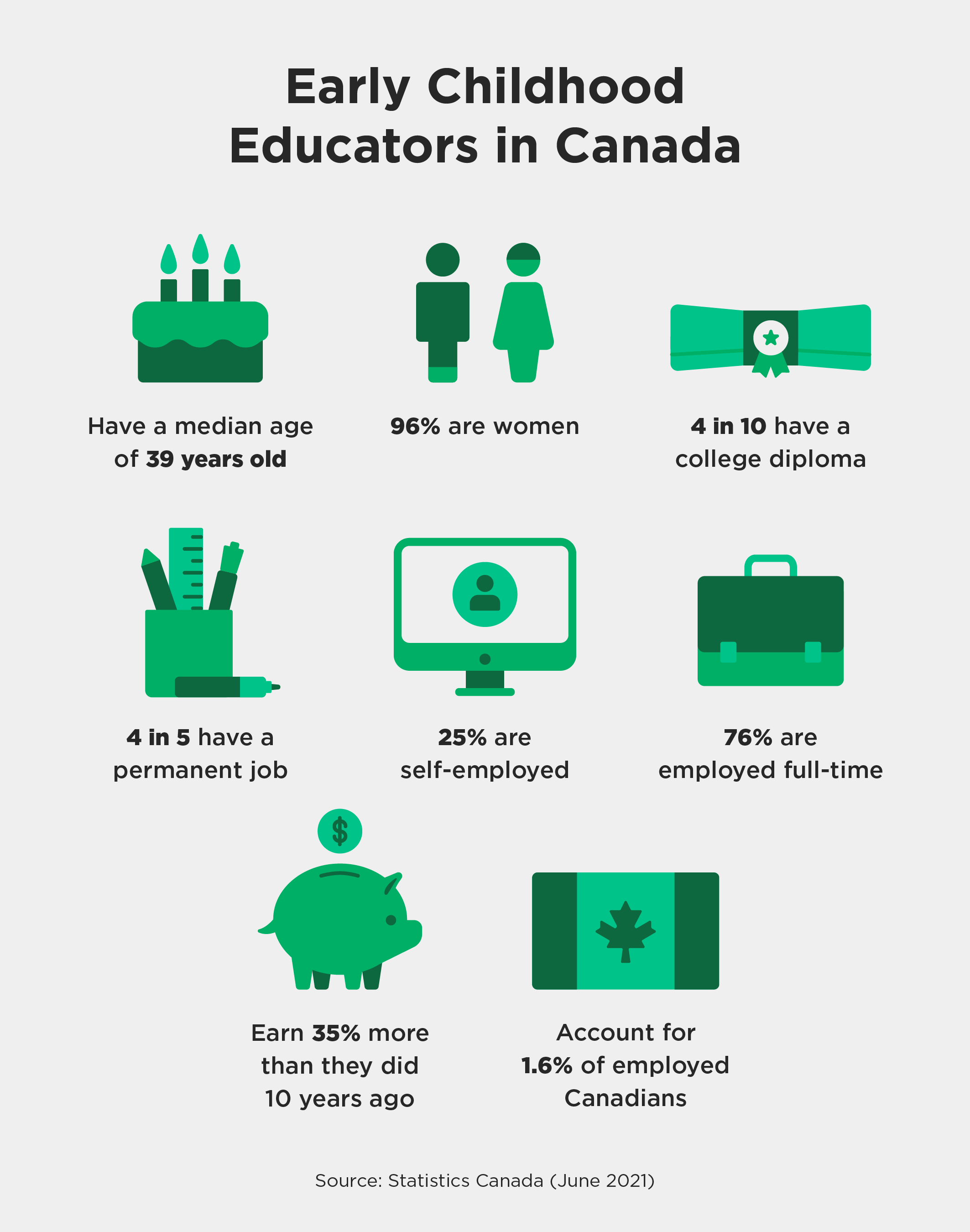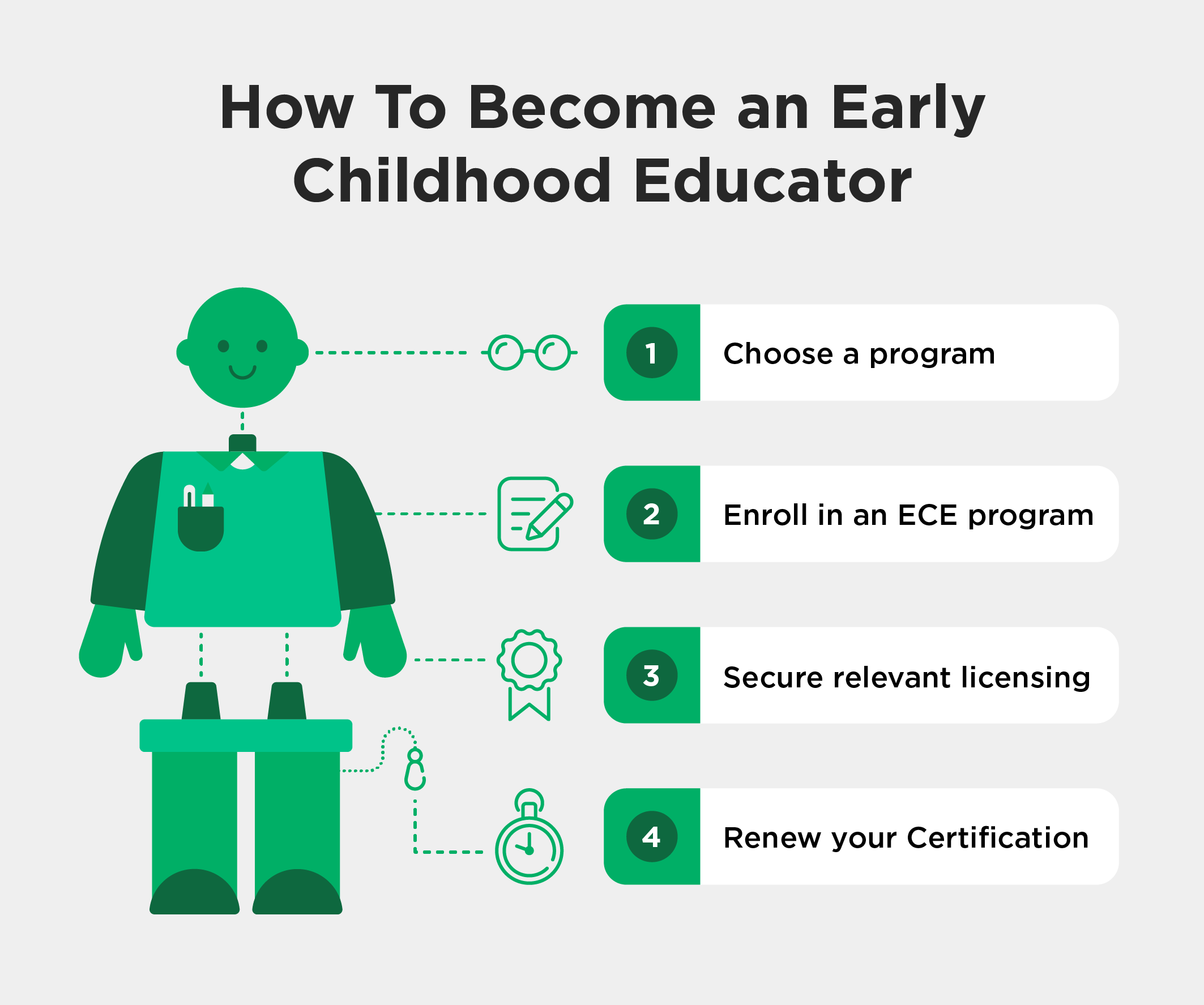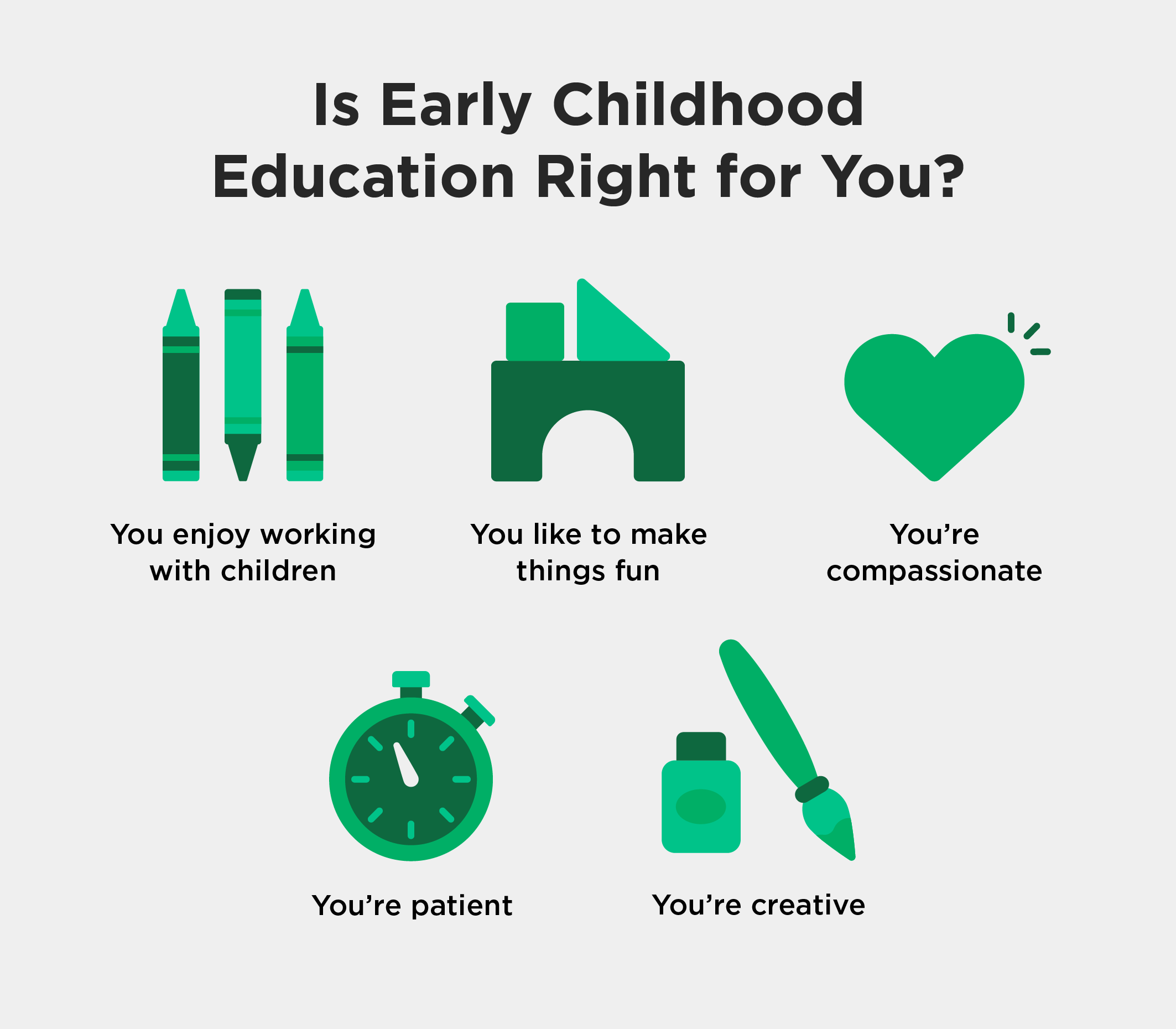What Is Early Childhood Education? (And How To Become an ECE)

quick answer
Early childhood education is the study of education and development for children ages 5 and below. A child’s first 5 years are crucial for social, physical, emotional, and intellectual development. Early Childhood Educators (ECEs) work hard to support young children’s growth in these areas. ECE Certification requirements vary between provinces but generally require First Aid and Childhood Education courses.
In This Article
The first few years of life are full of many milestones and can set the tone for how a person learns and interacts with others for the rest of their life.
Early childhood education helps children learn how to build relationships and resolve conflict. Not only that, but Early Childhood Educators (ECEs) help children play and learn in safe, inclusive environments where they can be themselves and collaborate with others.
We’ll break down what early childhood education is, how to pursue an ECE Certificate, who should consider this in-demand job, and how to become an ECE.

Early childhood education is an area of study focused on working with children ages 5 and younger to develop crucial life skills. These Educators play a pivotal role in child development. They help young children from all cultures and backgrounds grow intellectually, socially, and emotionally by creating safe learning environments. Not only do they teach children key skills, but they also teach them to play, build relationships, and accept others.
Since the primary years are crucial for development, Early Childhood Educators play an incredibly important role in shaping the lives of children in their community. It is their job to provide a well-rounded curriculum that supports intellectual development, nutrition and health, social relationships, and emotional well-being.
Generally, ECEs work in daycare, pre-kindergarten classrooms, or kindergarten classrooms. Regardless of the environment, ECEs might encounter different ages with different needs:
Children eligible for pre-kindergarten include children with disabilities, language delays, those who need to learn French or English, or those considered exceptionally gifted. There are slight variations at which age a child starts each type of school, depending on the province.
ECEs support different types of development depending on the environment in which they’re working. For example, an ECE leading an extracurricular play group might be more focused on social development than an ECE working on an early literacy program.
Early Childhood Educators have the opportunity to truly make a difference in their community. They teach children from infancy up to around 5 years of age. The stages of development and children’s needs differ as they grow through the years.
After following Robertson’s curriculum in early childhood education, you’ll know how to:
As an Early Childhood Educator, you’ll have the gift of making children feel included, safe, valued, and free to explore as they learn more about themselves and the world.

The role of an Early Childhood Educator is to plan and implement child care programs that promote a well-rounded understanding of life skills in young children.
In addition to incorporating education during daily activities such as play, routines, and self-care, ECEs support a child’s:
In a related role, an Early Childhood Educator Assistant (ECEA) or Child Care Assistant (CCA) supports an Early Childhood Educator in caring for children from infancy to preschool, but does not plan the programs. Both ECEs and ECEAs are employed in child care and daycare facilities, preschools, and kindergartens.
A typical workday for an ECE involves wearing many hats. In this career, you’ll get to organize curriculums, direct educational activities, and resolve conflicts while encouraging children to reach their full academic and social potential.
Additionally, an ECE’s core responsibilities include:
While there are technical elements to the job, Early Childhood Educators’ key skills are soft ones: compassion, empathy, and enthusiasm.

Early Childhood Educators have the expertise to support social, emotional, and educational development for children. Because of this, they work in a variety of settings, from daycare centers to classrooms, including:
You can take your early childhood education in different directions, depending on your interests. Whether you’d like to be hands-on in a classroom, help run community programming, or work as an Administrator, an Early Childhood Educator program can give you the skills you need to succeed.
So, how much does an Early Childhood Educator make? The average ECE in Canada makes $56,651 annually. It’s important to note, however, that this can vary widely depending on geographic location.
On the low end, for example, the median hourly wage is $16 per hour in Newfoundland and Labrador. On the high end, the median hourly wage is over $26 in Yukon — a difference of over $10 an hour.
| Average Early Childhood Educator Salary by Province | |
|---|---|
| Province | Median Hourly Wage |
| Nunavut | $22 |
| Northwest Territories | $23.98 |
| Yukon Territory | $26.16 |
| British Columbia | $20 |
| Alberta | $18.50 |
| Saskatchewan | $16 |
| Manitoba | $16.05 |
| Ontario | $20.51 |
| Quebec | $22.89 |
| New Brunswick | $18.38 |
| Nova Scotia | $18 |
| Prince Edward Island | $18 |
| Newfoundland and Labrador | $16 |
An ECE Certificate shows that you’ve completed an education in early childhood development, covering children ages 5 and younger. The majority of careers that work with children, whether you’re employed at a school or another program, will require this Certification.
While earning an ECE Certificate, you’ll gain a post-secondary education and learn about childhood development from social, emotional, intellectual, and physical perspectives. This teaches ECE professionals to provide age-appropriate support to children in their care.

If you’re interested in early childhood development, either as someone who wants to work directly with children or with organizations that do, an ECE Certificate helps you learn the basics you need. Some alternative careers include working with:
If you’re not looking to work directly with children, ECE skills can transfer to Administrator, Program Creator, and Coordinator roles. You may also want to work with parents or caregivers and run educational programming about child care as an alternative option.
Regardless of your path, we’ll discuss how to get started with a career in early childhood education below.
The first step to becoming an Early Childhood Educator in Canada is to determine which territory you intend to work in. Then, identify a program that aligns with the Certification requirements specific to your region.
There are some slight differences between programs, with some providing an Associate Degree, while others yield a Diploma or Certificate. Once you find a few that meet the basic requirements for a Certification, you can explore which of those programs are best suited for your needs. This might include considering different schedule types or class options.
There are a wide variety of ECE Certificates and training programs available across Canada, each designed to meet the varied demands of province-specific criteria. You should enroll in a program that meets the requirements of the region where you intend to ultimately work and your own needs, considering how long the program lasts.
Robertson College offers three programs that provide the education and training required to become an Early Childhood Educator in both Alberta and Manitoba:
Early Learning & Childcare Certificate
Program Length: 8 months
Working Location: Alberta
Schedule type: Hybrid
Campus: Calgary, Edmonton
Preps students for: ECE II
Early Learning & Childcare Diploma
Program Length: 17 months
Working Location: Alberta
Schedule type: Hybrid
Campus: Calgary, Edmonton
Preps students for: ECE III
Program Length: 19 months
Working Location:Manitoba
Schedule type: Hybrid
Campus: Winnipeg
Preps students for: ECE II
Guiding Children’s Behaviours 1 Micro-Course
Program Length: 40 hours
Working Location: Manitoba
Schedule type: Online
Campus: Online
Preps students for: ECE II
*Meets the 40-hour course requirement to be a Child Care Assistant and home-based Child Care Provider in Manitoba
Child Development 1 Micro-Course
Program Length: 60 hours
Working Location: Manitoba
Schedule type: Online
Campus: Online
Preps students for: ECE II
*Meets the 40-hour course requirement to be a Child Care Assistant and home-based Child Care Provider in Manitoba
With your program complete, the next step to pursuing a career as an ECE is to secure your licensing. Each province has its own regulating body that assesses and issues licensing for prospective ECEs.
Each province requires a minimum of 8 hours of first aid training to obtain ECE Certification. However, there are differences between provinces regarding other factors like minimum education requirements.
Once you’ve met the requirements set forth by your province’s regulating body and secured your licence, you’ll need to maintain and renew your licensing regularly.
This may require taking additional professional development courses in the future to ensure Educators are up to date with the latest best practices in the industry.
It takes a special type of person to work in the childhood education sector. If you have a handful of these characteristics, you could thrive in this career.

ECE stands for Early Childhood Educator or early childhood education. This area of study covers children ages 5 and younger. At this age, Educators help young children develop emotional, social, physical, and intellectual skills.
ECEs refer to the Certification of Daycare Workers. In most daycare centers, employees who interact with children are required to have this Certification, which includes information about childhood development, education, and basic first aid.
Early Childhood Educators teach children from infancy up to around 5 years of age. The stages of development and children’s needs differ as they grow through the years. These years are crucial to develop the life skills that will help children as they grow older, such as motor skills and emotional regulation.
While many parallels exist between ECE programs and daycare centers — like providing interaction with peers and a safe, adult-supervised environment — they are not the same.
The fundamental difference between daycare centers and ECE programs is that ECEs have a greater focus on developing skills in young children and preparing them for a formal educational setting. Daycare centers are more focused on providing a safe space for children during working hours so caregivers can rejoin the workforce.
The average length of programs required to become an ECE in Canada is two to four years, but as province-specific requirements vary dramatically, so can the length of time required to join the workforce as an ECE. You can complete some ECE programs in under two years — or as little as eight months.
The best ECE course is one that fulfills the requirements in your province to properly prepare you for working as an ECE. A school with a college of ECE should be able to provide guidance on which courses to take. Robertson College has some of the best educational programs in Canada, and our School of Community Services has programs to help you get your ECE II or ECE III Certificates so you can make a difference in your community.
As an Early Childhood Educator, you’ll have the gift of making children feel included, safe, valued, and free to explore as they learn more about themselves and the world. If you’re a patient, energetic, and creative learner looking to begin a life-long career working with children, becoming an ECE is a good job that may align your talents and interests.
At Robertson College, our ECE programs prepare you to apply for ECE II or III Certificates with a mix of required learning and practical experience opportunities. You’ll learn everything you need to go out and have a positive impact on the next generation.
Ready to begin a career that helps others? Explore our School of Community Services for information on ECE programs and more.
In This Article
Once you take the first step, one of our Student Admissions Advisors will get in touch to better understand your goals for the future.
Apply Now